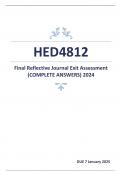HED4812
Final Reflective Journal Exit Assessment
(COMPLETE ANSWERS) 2024
DUE 7 January 2025
,ACTIVITIES
Reflective Journal Entry 1. Depth of Reflection (30 marks) Reflect deeply on your journey throughout
this module. How has your understanding of educational leadership and management evolved?
Discuss any significant insights or shifts in perspective you have experienced. 2. Application of
Theoretical Concepts (25 marks) Select one key theoretical concept discussed in the module (e.g.,
transformational leadership, distributed leadership, systems thinking) and discuss its relevance and
application in educational leadership and management contexts. Provide examples or scenarios to
illustrate your understanding. 3. Critical Analysis of Contemporary Approaches (25 marks) Evaluate
two contemporary approaches to educational leadership and management introduced in the
module (e.g., instructional leadership, servant leadership, ethical leadership). Analyse their
strengths, limitations, and potential implications for educational settings. Compare and contrast the
approaches, highlighting their unique contributions. 4. Personal Insights and Reflections (15 marks)
Share any personal insights, epiphanies, or transformative moments you have experienced during
this module. Reflect on how your learning experiences have influenced your professional growth and
aspirations in educational leadership and management. 5. Clarity of Writing and Organization (5
marks) Ensure your reflective journal entry is well-structured, logically organized, and free from
grammatical errors. Use clear and concise language to articulate your thoughts and ideas effectively
, QUESTION ONE
Reflective Journal Entry 1: Depth of Reflection
Introduction
The journey through this module on educational leadership and management has been
transformative. Initially, my understanding of the concepts was rooted in simplistic notions of
authority and administration. However, as the module progressed, I encountered new perspectives
and gained deeper insights into the multifaceted nature of leadership and management within an
educational context. This reflection captures the evolution of my understanding, the shifts in my
perspective, and the significant takeaways that will shape my future practice.
Evolution of Understanding
At the outset, I equated educational leadership primarily with the figure of a school principal or
administrator who makes top-down decisions. Management, in my earlier understanding, was about
maintaining order, enforcing policies, and achieving predetermined outcomes. This module,
however, challenged these assumptions and expanded my perspective in several ways:
1. Leadership as Influence, Not Authority
One of the most profound shifts in my understanding was the recognition that leadership is
not synonymous with authority. Leadership is about influence, vision, and the ability to
inspire others toward shared goals. This idea was emphasized through discussions on
transformational leadership, where leaders empower their teams and foster innovation
rather than merely enforcing compliance.
2. Shared and Distributed Leadership
Another significant insight was the concept of distributed leadership. This approach
promotes the idea that leadership does not rest solely with those in formal positions of
power but is distributed across the organization. For instance, teachers, support staff, and
even students can play leadership roles within their spheres of influence. This perspective
resonated with me as it underscored the importance of collaboration and collective effort in
achieving educational excellence.
3. The Interplay Between Leadership and Management
Previously, I viewed leadership and management as interchangeable. However, this module
clarified the distinction: leadership involves setting a vision and inspiring change, while
management is about implementing strategies and ensuring operational efficiency. Effective




